CHAPTER 2
The birth of Philosophy
Till the 7th century B.c. the human mind was still in a lethargic state, thinking was not critical yet. Kings, pharaohs and priests were the dominant figures in every society representing the gods upon the earth, ruling despotically and capriciously in the name of these same gods. Through them was revealed the truth of the gods. As the source of truth was transcendental, the purpose of life was presented and imposed as incontrovertible and non-negotiable. The absolute rulers set the gods as the distant ensurers of the purpose of life. Furthermore, they regarded them as the origin of their own establishment. In the era of the myths there were everywhere conservative political forces. The kings were monarchs and so were the gods. Zeus for example could alter the world’s order, if he so pleased, he could make the sun disappear during the day. Justice was the will of the stronger and was translated into religious devotion. Humans’ actions had to be likeable to the gods and their spokesmen. Nature was personified and therefore deified. Nothing was in people’s hands, they had to rely solely to supernatural, exocosmical forces and their interpretations, compelled by the various authorities, always according to their own benefit.
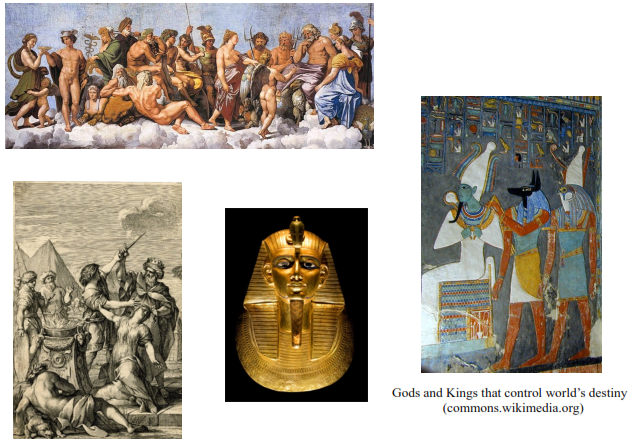
And then came the Greeks. The conventional explanations about cosmos were not enough. No one else before them handled in such a way the question about the nature of the world. We won’t encounter anything equivalent to the neighbours. The reality becomes for the Greeks of the Archaic era the first stimulation, that sets in motion the mind and leads in the 6th century B.c. to the birth of the Philosophy. By then Greeks have left behind the myths known to us by the epic literature and they have adopted more critical thinking about the world around them. Their perception expands and deepens, they get overwhelmed by new questions, that demand answers.
The maturity starts, when life in Greece takes civic form. The inherited constitutions (kings, gods, traditions etc.) get under questioning. The creation of the city-states and the development of Democracy helped freeing the human mind. Now people could converse, exchange opinions, even express criticism. Through colonisation and trade people had the opportunity to exchange ideas all over the Mediterranean. These socio-political changes along with the technological advancements, the possibility of communicating with other cultures, the curiosity and the need to set new orientations were the conditions for freethinking. The Greek social environment made that possible. The mythological thinking was gradually replaced by the rational. Nature is not anymore separated from the human beings nor product of gods, but it is part of the human civilisation. Cosmos comprises an organised system with its own laws. It doesn’t have supernatural origin. On the contrary the creation of cosmos and humans has natural causes, that humans can discover. For the first time thinking works without the obstacles of dogma and knowledge is not imprisoned behind the impenetrable walls of a clergy.
The dissociation of the Greek mind from the mythical world and the shift towards the person and the presence is firstly evident in the lyric poetry beginning of the 7th century B.c. As the kings slowly started to fall and new centres of power emerged, new traditions were shaped. Epic poetry was mainly focused in the heroic events and acts of the royals, while in the post-dated lyric poetry is promoted the importance of the individuals. The socio-political changes are reflected in the poetry. The everyday life, the concerns of the common people, the new moral values like justice and equality, the questions about cosmos, knowledge, about the humans and their life become now the subject of poetic discussion and dialogue. If the element of the myth on its own was enough to give birth to the critical thinking, then all the people of the ancient world should discover the concept of philosophy, as long as they had developed myths in their culture. But that’s not the case. Naturally the
Greeks adopted mythological material, ideas and practical knowledge from Mesopotamia, but we can’t determine in what degree. What’s important, is how they processed all the influences with their free spirit, lucidity and insight, how Greek thinkers dared to question traditional conventions and to challenge the prejudices of their time.
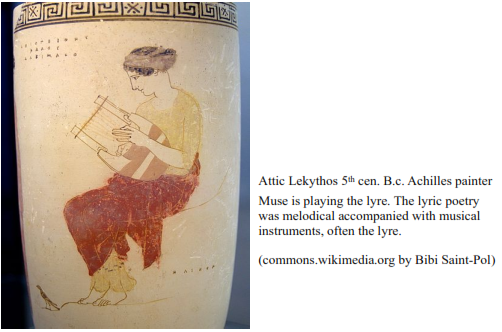
About 600 B.c. the Greek cities of Ionia in Minor Asia were the intellectual and cultural leaders of Greece. The starting point was Miletus, one of the wealthiest cities with great nautical power and colonies east and west. There lived and excelled the first philosophers, Thales, Anaximander and Anaximenes, which are referred to as the pre-Socratics, as they were born before Socrates. Nietzsche states that, they invented the archetypes of the philosophical system in total. Their main focus was to conceive a cosmological theory purely based on natural phenomena. Therefore, they rejected all traditional explanations based on religious authority, dogma, myth and superstition. They all agreed on the notion, that all things come from a single ‘primal substance’.
Thales claimed it was the water. It is not clear enough, if he meant, that everything consists of water in some form, or that just originates from it. Either way he didn’t manage to explain much, but the fact that he was looking for a natural substance, which unifies and simplifies the phenomena of the visible world, instead of complicating things by invoking numerous gods, he was at least seeking knowledge in the right direction. He possessed an inquiring mind at a time, when very little was realised and understood.
Anaximander believed, that the best interpretations could not always rely on what can be comprehended through the senses, but sometimes one is forced to dig deeper. His substance was different from all other, it was something invisible, infinite and eternal. He wrote a book ‘About nature’, where he basically covered everything. Whatever he didn’t know, he invented it. That does not mean he was lying, but that he tried to find the truth using logical thinking. He made speculations about the origin and the fate of the universe, the composition of the sun, the moon and the stars, the beginning and development of life, the weather and every natural law, that governs our cosmos. He also offered a resourceful explanation about planet earth, as he proposed, that it does not need any kind of support, but it is rather balancing in the centre of the spherical universe with everything else revolving around. This idea is remarkably progressive, because he took a step beyond the material reality and used a mathematical idea. He also drew the first map of the known world of his time. Anaximander’s work not only attests to the persistence of the Greeks to bring order, wherever it seemed to be absent, but also presented the fundamental concept: in science, the world is not just, what is visible with the naked eye.
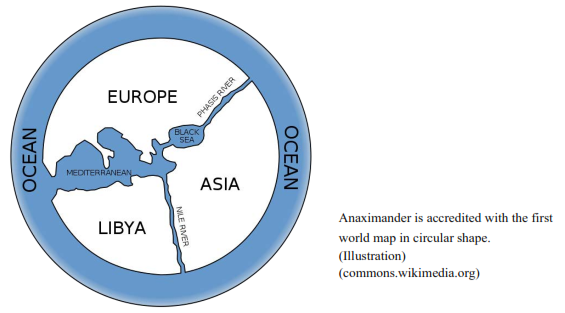
Anaximenes just like Thales, chose one of the natural elements, the air. He even rejected Anaximander’s theory and he proposed, that air was supporting planet earth. He envisioned air as an invigorating force, that takes different forms depending, how thin or thick it is. The thinnest being the fire, then the normal air, a bit thicker the wind, after the clouds, then follows the water, the earth and the rocks. He used also this theory to explain the weather and the earthquakes. The important innovation in his theory is the fact, that he traces the differences in the quality or the species back to the quantity. The variety of the elements depends on, how much air they contain. He introduced the idea, that the book of nature is written in the language of mathematics.
All the early Greek thinkers shared the idea, that world was evolved somehow on its own and not created by some gods out of nothingness. Gods could shape things, though using pre-existing elements, of which they were made as well. The scientific thinking was not born yet, but still they dared to seek the natural cause of things around them.
Contemporary to Anaximenes was Pythagoras. He was born at the island of Samos circa 570 B.c. and at the age of 40 he moved to the Greek colonies in south Italy. He founded his school, where his many followers, both men and women, lived and worked communally. Abide by a code of secrecy they lived by rules of behaviour including, when they spoke, what they wore and what they ate. They had no personal possessions and were vegetarians. He and his followers were politically active and often they were pursued. In 460 B.c. their meeting places were burned and destroyed, and many members were killed. There are many rumours and stories regarding his life, often controversial, but one thing is certain: Pythagoras or at least his philosophy was and still is everywhere. Every kid in school knows his theorem, which states, that the square of the hypotenuse of a right triangle equals the sum of the squares of the other two sides. Thus, he is credited as the author of the first known mathematical formulation. Moreover, Pythagoras studied odd and even numbers, triangular numbers and perfect numbers. He has contributed to our understanding of angles, triangles, areas, proportion, polygons and polyhedra.
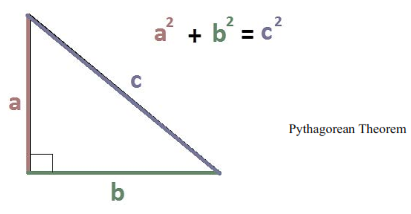
According to Pythagoras the purity and the consequently union with the divine were achieved through a life of cogitation and systematic research. That included many things, but mathematics was particularly valuable. A good Pythagorean should above all study mathematics, geometry, astronomy and music, because each one of these is revealing some aspect of the principals, that govern the universe. Pythagoreans also supported, that nature should be studied in an altruistic manner and not with a practical interest. They seem to be the first, that used the term philosophy, meaning the love for the wisdom itself. For instance, if geometry is used for practical reason only, as the ancient Egyptians did to calculate an acreage, then the soul remains locked in the earthly prison. If it is used to study the beauty of the universe, then a small part of its magnitude will touch the student too. It is almost, as if he is taking part in that beauty and order.
As Pythagoras strongly believed in reincarnation, a soul that is attached to earthly concerns, stays impure and can never break free. After death it will just move to another body of a human or an animal. However, a human, that follows in its life a program of spiritual training, can set its soul free and rise to the immortal kingdom. Philosophy is the right path and mathematics is the key, that opens and unravels the artistry and symmetry of the universe. When Pythagoreans made a monumental discovery regarding the correlation between numbers and musical sounds, they demonstrated, that phenomena have a secret structure, which can be fully analysed. Pythagoras is credited with the discovery, that the intervals between harmonious musical notes always have whole number ratios. Playing half a length of a guitar string gives the same note as the open string, but an octave higher. He has described the first four overtones, that create the common intervals, which have become the primary building blocks of musical harmony: the octave (1:1), the perfect fifth (3:2), the perfect fourth (4:3) and the major third (5:4). That discovery was extraordinary, because it offered proof, that numbers can in fact unlock the secrets of the world. Numbers possess personalities, characteristics, strengths and weaknesses. For Pythagoreans the number one was the generator of all numbers, two represented opinion, three - harmony, four - justice, five - marriage, six - creation, seven - the seven planets or ‘wandering stars’ etc. Odd numbers were thought of as female and even numbers as male. The holiest number of all was ‘tetractys’ or ten, a triangular number composed of the sum of one, two, three and four. As expected, they didn’t know, how to express all their theories, so based in the legacy from their predecessors they declared the numbers the beginning of everything. They claimed for instance, that the planets and stars moved according to mathematical equations, which corresponded to musical notes, and thus produced a kind of symphony, the ‘Music of the Spheres’.

Pythagoreans were convinced, they can search even deeper and they came to the conclusion, that numbers too, came from something else, something unlimited and infinite. Furthermore, the world depends upon the interaction of opposites, such as male and female, lightness and darkness, warm and cold, dry and moist, light and heavy, fast and slow. But how did it all start? The Pythagoreans produced an explanation of the beginning of cosmos. Their version starts with a seed, that was fed off of the infinite. As it was growing, it produced different forms and shapes. The planets, the music, the people, everything is the result of this process. The celestial bodies are spherical, because the sphere is the most perfect solid figure and together with the earth and everything else in the world revolve around an invisible, central fire. The most important about this theory is, that they relocated the earth from the centre of the universe. So, 2.000 years later Copernicus states, that Pythagoras’ theory gave him the courage to explore the unorthodox idea of earth moving around the sun, instead of sitting in the middle motionless. Kepler, also influenced by Pythagoras, claimed, that the sky had to be arranged harmonically to reveal itself with simple mathematical relations and he made an attempt to discover the laws, that lie behind.
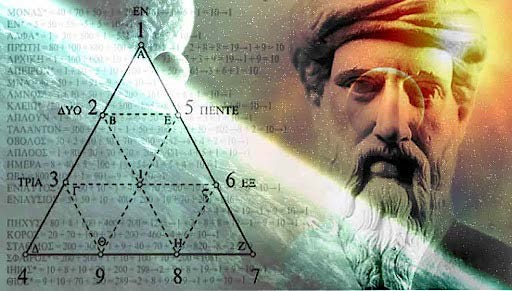
The Tetractys, is an equilateral triangle consisting of 9 smaller ones. It is the sum of the first four numbers, 1+2+3+4=10, and that is also the total of each side of the triangle either as numbers, or as letters or as words. It is a mathematical idea and a multidimensional symbol, which embraces the principles of the natural world, the harmony of the cosmos, the ascent to the divine and its mysteries.
One of the most famous pre-Socratics philosophers is Heraclitus (540 - 480 B.c.), the first western philosopher to go beyond physical theory in search of moral applications, the first to make human values a central concern. While he continues many of the physical and cosmological theories of his predecessors, he shifts his focus from the cosmic to the human realm. He proposed a distinctive theory, which he expressed in oracular language. He claimed, that universe existed always, so he didn’t seek the beginning of everything. On the contrary he tried to find himself.
The previous philosophers were too busy to discover and explain the world, that they didn’t have time to define themselves. As Heraclitus was certain, that the same principals determine the humans and the nature, he believed, that one way to explore the latter was to unravel the first. Perhaps he was also the first, who treated the soul as an expression of the humans’ cognition rather than a heavenly puff, which brings the body into life. He focused in the endoscopy analysing the dreams, the emotions and the character of the individual, which he deemed it to be its fate. He entrusted in the information obtained through the senses. “Whatever stems from sight, hearing, learning from experience, that I prefer, providing that the soul understands”. That can be achieved only, if the basic rule of nature is apprehended, which he called ‘Logos’ and can be translate into ‘Logical Reason’. Everything happens based on logic, according to very strict laws, irrespective if people assimilate it or not. The Reason is the cosmical law, the force within everything. Human logic is part of it. That’s why the Reason is common and obligatory to all. The divine is the cosmical mind, that creates everything. Divinity is present in the world, but not as a conventional anthropomorphic being.
Heraclitus sees the great majority of human beings as lacking mental capacity. Most people sleep-walk through life without realising, what is going on about them. Awareness is a rare and precious commodity, yet wisdom is possible for those, who can discern it. What did then Heraclitus perceive, that everybody else failed to see?
He criticised his predecessors and contemporaries for their failure to see the unity in experience. Everything to him, is conflict and unrest. Behind the evident harmony and stability there is a battlefield of contradictory opposites. Nothing remains the same for ever, but everything flows in an eternal change. War is the father of all and king of all. If it were not for the constant conflict of opposites, there would be no alternations of day and night, hot and cold, summer and winter, even life and death. Indeed, if some things did not die, others would not be born. Conflict does not interfere with life, but rather is a precondition of life. Fire is the element, that can be easily witnessed to achieve that change, therefore it was the perfect substance in Heraclitus’ image of the everlasting commotion. He placed it in an eminent position, for it is the most inconstant and changeable element. All things are just manifestations of fire. Opposites are necessary for life, but they are also unified in a system of balanced exchanges. One thing is transformed into another in a cycle of changes. So, in some sense all things are one. Day and night are the two sides of the same coin. The road up is also the road down. The entrance is usually also the exit.
The illness makes health so sweet and beneficiary.
In the field of astronomy, he seemed to be aware of the trajectory of the moon and the sun, as well as the planets by studying their orbit. In political theory he maintains, that one good man is worth ten thousand ordinary people and he criticises his fellow citizens for banishing a distinguished leader. Evidently, he trusts the few and distrusts the many. He sees good laws as being reflections of universal principles. The people of a city should fight for their laws, as they would for their city walls. The laws provide a defence for a city and its way of life. “As a city relies on its wall, speaking with sense we must rely on a common sense of all things. All human laws are nourished by the one divine law. For it prevails, as far as it will and suffices for all and overflows.”
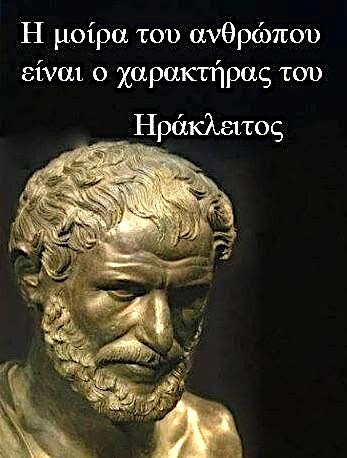
Man’s fate is his character (erevoktonos)
And the list of philosophers, that lived in the archaic era, goes on. Empedocles born in the colony of Agrigento in Sicily circa 492 B.c. envisioned a theory so simple and apparently convincing, that persisted till the Renaissance. Philosopher, statesman, poet and physiologist with medical skills and healing powers, to his contemporaries seemed more than a mere mortal. Aristotle hailed him as the inventor of rhetoric and Galen regarded him as the founder of Italian medicine, while Lucretius admired his hexametric poetry. Empedocles was a follower of Pythagoras, hence a believer in the transmigration of souls and a vegetarian. He claims to be a ‘Daemon’, a divine or potentially divine being with magical powers including the ability to revive the dead and to control the winds and rains. He is reported to have been wealthy and actively pro-democratic.
Based on his theory everything consists of a mixture of four indestructible elements, earth, air, fire and water in various analogies. The force of Love ‘Filotis’ attracts these elements and causes their union in different combinations and proportions, while the force of Strife ‘Neikos’ is responsible for setting them apart. Birth or creation is nothing more than formations from these pre-existing elements and death or destruction is just their separation. For the first time someone proposed a distinction between matter and the forces, that effect upon it. These two forces are engaged in an eternal battle for domination of the cosmos and each one prevails in turn in an endless cosmic cycle. There was a time, when Love prevailed and all the elements were unified in one divine sphere, till Strife took slowly over and gradually scattered the elements away, until there was enough separation for matter to come into existence, for the world to be created and for all life to be born. One day Strife will achieve total domination and everything will collapse and disperse and so on, until Love will start to gain power all over again. Today the scientists have recognised similarities between Empedocles’ description and the Big Bang - Big Crunch. More than 13 billion years ago matter was concentrated in one spot, that expanded and formed everything we know, while under specific conditions in the future gravity will contract everything back in one single spot.
Empedocles seems to have been also the first philosopher to give a detailed explanation of the mechanism by which, we perceive things. All things give off effluences, which enter pores in the sense organs. Certain effluences enter certain sense-organs, when they meet pores of the correct size and shape to admit them. Humans have the ability to see and perceive the different elements, because they are made of the exact same elements. Further, perception is achieved by the attraction of similars, common belief for the ancient Greeks. Humans can see bright colour, because the material, that the eye is made of, contains also bright elements.
Empedocles made also the earliest attempt to present a detailed rational mechanism for the origin of species. He concluded, that different characteristics of various organisms can have the same function and cause equivalent results, which is a main principal in biology. Further he added very successfully, that all living beings owe their useful characteristics to the simple fact, that they are suitable for survival and reproduction. It seems he conceived the idea of natural selection about 2.300 years, before Darwin and Wallace managed to prove that.
In his religious assumption he argues, that the Olympian gods came into being as misinterpretations of the natural world. The real gods are the elements of nature and the cosmic forces, that orchestrate their endless evolutionary cycle. In his ethical teachings suggests purification of the soul in order to achieve perfection and unity with perfect Love. He pictured a time in the past, a sort of golden age, when this universal harmony existed.
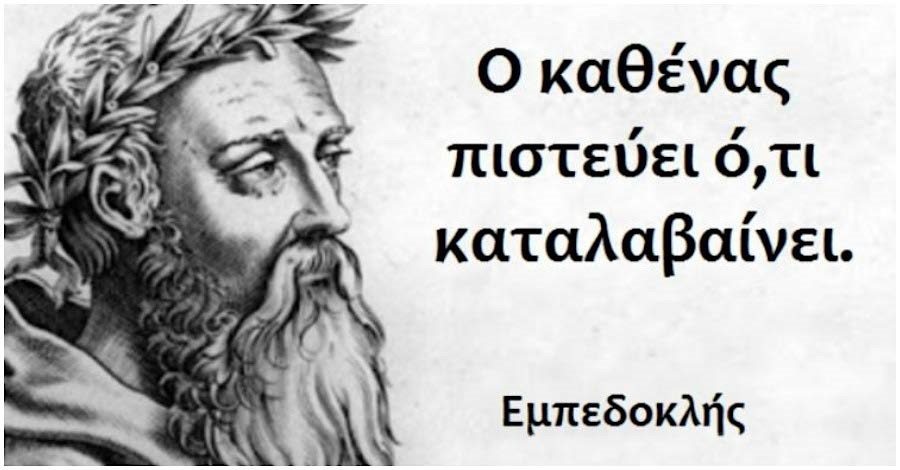
Each one believes, what one can understand. (true.gr)
From all the above it is clear, that the philosophers in the archaic time did not focus only in the natural world and its origins. They were theorising about the humans and their society as well. The man and his behaviour are part of the natural world and therefore part of their philosophy, as there is no separate field developed yet. But the value of their task is still not fully comprehended. When these thinkers took the first steps, the path of science was not paved yet. They had to show the way. The pressing bewilderment at everything, that takes place in the land and in the sea, up in the sky and in the life of the animals and the plants dictates their course. That is their driving force, the query, that originates from the native desire of the Greeks for knowledge.
But the material was poor, the instruments were missing and the criticism for the validity of the knowledge non-existing. So, the pioneers of the cosmology apart from the theory, must also create the language of the philosophy, develop the terminology and initiate the critical analysis. Meanings like cosmos, infinity, space, time, atom, void, mater, number, energy, power, value, magnitude, motion, continuum, union, part, all, decline and so many more were introduced by these philosophers, passed into the language of science and got established in the scientific field. The preSocratic thinking offered the first genuine philosophical and scientific gifts, that nourished and developed the western mindset. Through spiritual wealth, creative imagination and systematic pursuit of the truth in favourable conditions, where free dialogue and free exchange of ideas prevails, they launched the rational explanation of the world. It was the most outstanding, the most decisive, the most astonishing event ever occurred in the history of cogitation, that led on to the idea of freedom.











